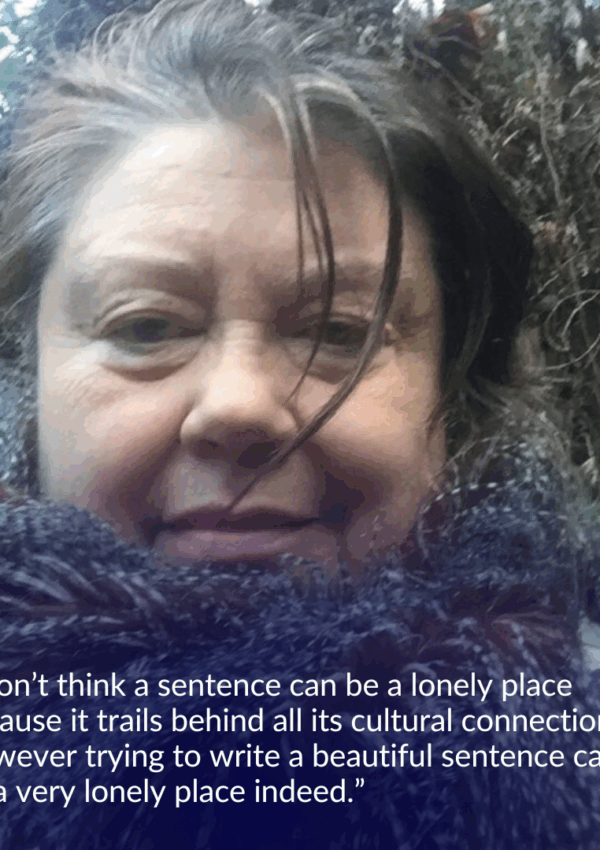The poetry in Tracy K Smith’s book, Life on Mars, examines the limitedness of the human species. The poetry speculates on the smallness of humankind, the incapacity of human intellectuality, and the irrationality of human emotions. The language is accessible and creatively used, with strong use of alliteration and internal rhyme.
These poems use distance of time and space to question the importance of human existence. In “The Museum of Obsolescence,” human concepts of “Love” and “Disease” are installations in a futuristic museum. In “The Universe: Original Motion Picture Soundtrack” the narrator states “So much for us. So much for the flags we bored.” The message to the reader is humbling: human’s greatest preoccupations are ephemeral and of little ultimate consequence. Perhaps the best example is in the poem titled “The Universe is a House Party.” Hypothetical aliens visit with parental condescension an overenthusiastic universe. Below are the last three stanzas:
The universe is expanding. Look: postcards
and panties, bottles with lipstick on the rim,How marvelous you’ve come! We won’t flinch
At the pinprick mouths, the nubbin limbs. We’ll rise,Gracile, robust. Mi casa es su casa. Never more sincere.
Seeing us, they’ll know exactly what we mean.Of course, it’s ours. If it’s anyone’s, it’s ours.
Throughout Life on Mars, the poems continually doubt the usefulness of human knowledge. Many of the poems contain rhetorical questions (e.g. “Does God love gold?;” “Time never stops, but does it end?;” “What lives beside us passing for air?;” “What happens when the body goes slack?;” etc.). These questions are unanswerable, yet the poems suggest that humans vainly seek the unknowable for the sake of solace. This is especially poignant if one views this book as a work of mourning for her father, an engineer who worked on the Hubble telescope. Seen from this light, the vastness between the knowable and unknowable extends beyond the realm of science and into the realm of living and dead, daughter and father. Below are some stanzas from “The Speed of Belief.” It takes up the majority of the second section and is dedicated to the author’s father.
What heat burns without touch?
And what does it become?
What are they that move
Through these room without evenThe encumbrance of shadows?
If you are one of them, I praise
The god of all gods, who is
Nothing and nowhere, a lawImmutable proof. And if you are bound
By habit or will to be one of us
Again, I pray you are what waits
To break back into the worldThrough me.
The reliance on human emotion is equally futile. The narrator often views the emotional as naïve, destructive, and unprogressive. In “The Museum of Obsolescence” humans have “faulty eyes … telltale heat;” in “No-Fly Zone,” a woman fears what has already left; in “The Speed of Belief,” the narrator reflects that as a young girl she finished her father’s breakfast, completely unaware of the grief caused by her grandfather’s death. The poem “Challenger” best exemplifies this harmful irrationality of human emotion.
She got herself so wound up. I think
She likes it. Like a wrung rag, or a wire
Wrapped round itself into a spring.And the pressure, the brute strength
It takes to hold things that way, to keep them
From straightening out, is up to herTo maintain. She’s like a kettle about to blow.
All that steam, anxious to rise and go.
I get tired watching it happen, the eyesAlive with their fury against the self,
The words swelling in the chest, and then
The voice racing into anyone’s face.She likes to hear it, her throat hoarse
With nonsense and the story that must
Get told again and again, no matter.Blast off! she likes to think, though
What comes to mind at the moment
Is earthly. A local wind. Chill and small.
The two polarities, the intellectual and the emotional, become functional toward the end of the book. Each start to occupy similar spaces. While the emotional occupies a bigger chunk of each poem, the intellectual is slipped in almost as a steering mechanism, a rational break in the emotional spaceship (if I may). In “Willed in Autumn” the narrator daydreams a pastoral life with her lover but “writes it down so it will stay true.” She also lets her lover go off alone because she knows that they are too sensitive to currently be reconciled. “Everything that Ever Was” ends with the stanza “Under the soil is a little tickle of knowledge / The great blind roots will tease through / And push eventually past.” Also, in these sections of the book, the narrator deals with more personal and immediate issues, such as writer’s block and her romantic relationships. Living becomes rational and the solutions attainable.
The vocabulary in Smith’s book is amazingly simple. This was perhaps a conscious move to balance the extraordinary subject matter with ordinary language. Much of the sound relies on internal rhyme and alliteration. The use of both tightens the poem. While the alliteration is easily recognized, the internal rhyme can be harder to pinpoint. This is either due because a poem may use more nuanced rhyme or because many similar sounds are incorporated. Below is an example of the latter. It is from the poem “It & Co.”
Have gone looking for It everywhere:
In Bibles and bandwidth, blooming
Like a wound from the ocean floor.
Still, It resists the matter of false vs. real.
Unconvinced by our zeal, It is un-
Appeasable. It is like some novels:
Vast and unreadable.
In both senses of the word, Life on Mars is a fantastic read. The subject matter goes from grand to modest as the book reads on. Questions are constantly asked, and perspectives are challenged, but neither are resolved by the narrator. This is perhaps the real beauty of the book: the agency it demands from its reader.
 Lauren Sartor is a poet whose work has been published in Black Fox Literary Review, Broad! Magazine, Calyx Journal, Literary Juice, Bitchin’ Kitch, The Former People’s Journal, and others. Her work takes an earnest look at the conflicted, and often misrepresented, facets of ordinary livelihood. She is currently a Ph.D. student at SUNY Binghamton.
Lauren Sartor is a poet whose work has been published in Black Fox Literary Review, Broad! Magazine, Calyx Journal, Literary Juice, Bitchin’ Kitch, The Former People’s Journal, and others. Her work takes an earnest look at the conflicted, and often misrepresented, facets of ordinary livelihood. She is currently a Ph.D. student at SUNY Binghamton.



